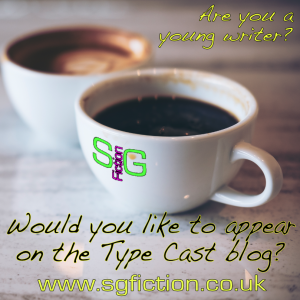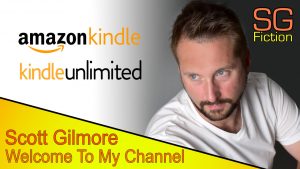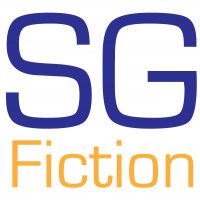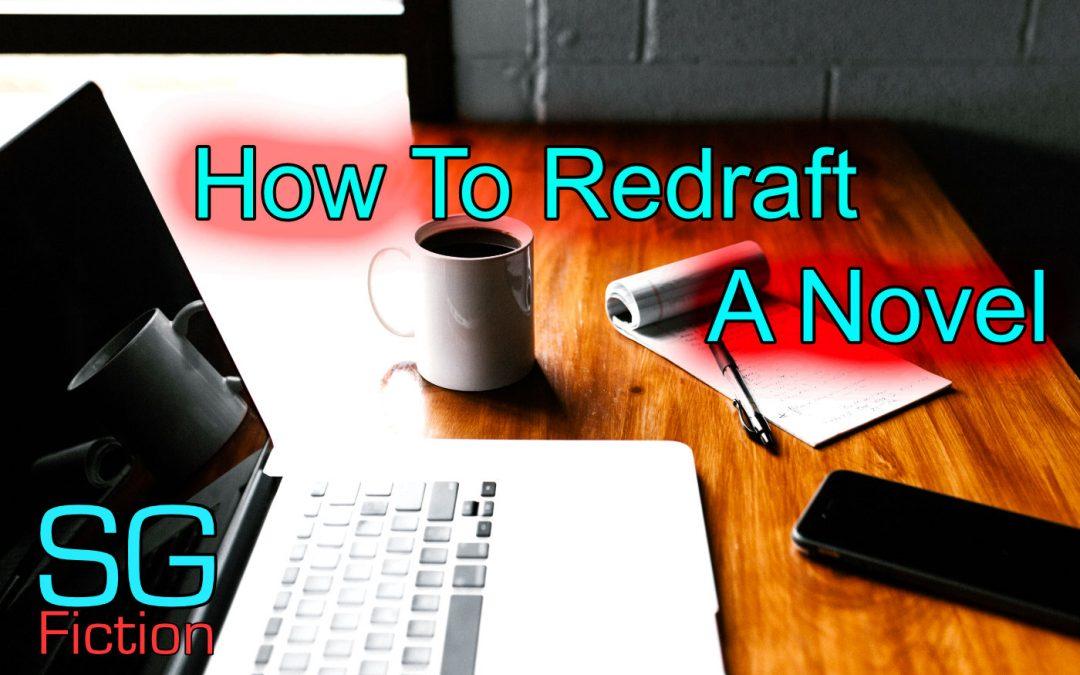How an author can become his/her best constructive critic during your novel redraft
The Redraft: Now It Begins
The redraft is upon me and not I need to get it done! Over the past few months, I have been swamped. Between working as a freelance copywriter in Belfast, completing Digital Marketing training, making content for this website, and SG Fiction YouTube channel, I have been flat out. There is no doubt that the process is incredibly exciting and rewarding. Still, it is also tiring, and I have found it difficult to stay on track with redrafting my second, upcoming novel, Anna’s Awakening.
Redrafting is something that I, and many other self-published, independent and traditionally published novelists and writers can find tiresome. I am one of those people. Again, like my retraining and changing career, it is rewarding and engaging, but I can’t help but look at my 90,000-word manuscript and see it as some form of Man Versus Food challenge. Every time I edit and reprint a chapter, there is yet another chapter to tackle.
It is a long process and, for some reason, it feels many times longer than writing a book in the first place. Progress is being made, but it is slow, and I need some support from my fellow authors, writers and bloggers in the online writing community. Help me get through this guys! Comment below with an encouraging message to lead me through the darkness, into the light! If you are trying to redraft your novel, send me a message of support!
Indie Showcase Enquiries
When writing a blog post, I love scrolling through other creative writing blogs out there and seeing what inspires them to compile what they do. Many of those fellow bloggers, authors, and writers accept submissions from guest bloggers. I thought about this and concluded that I would consider that for my SG Fiction creative writing blog.

Email Scott to enquire about taking part in the Indie Showcase if you have an idea for a blog.
If this is something you would like to consider, please email me at scott@sgfiction.co.uk with your idea for a blog, and we can start a conversation. My book audience includes people under the age of sixteen, so you would need to consider that when developing your titles. I would love to give other independent authors the chance to write a blog if they don’t have a platform of their own.
For me, I want it to be about the guest author sharing their thoughts on a chosen topic, as previously agreed by me. As it is my site, I am ultimately responsible for what goes on it, and I will have to vet the content ahead of publication. I would also go through the document and highlight specific words for Google Search and add an intro and conclusion about who you are as an author.

If you are a young writer between 16 and 25, please email Scott to enquire about being part of his Type Cast Young Writers’ Blog.
Throughout my author and creative writing blogs, I want to help share my views and experience of writing, whether you are writing as a beginner or are experienced at novelist. It doesn’t matter. I feel we can all learn from one another.
By sharing our craft, our process, and how we work as creatives, we can:
- Help to hone our process further;
- Get inspiration from fellow writers;
- Feel part of a wider community;
- Feel less alone in a very lonely profession, hobby or past time.
This blog is created with my suggestions that you may disagree with, and that’s fine. The method of exploring others’ views is where we can learn as authors and see what helps or hinders us. We need to remember that the process is for us to write fiction better or write the best stories we can.
Read this author blog article to see what you can learn and please email me at scott@sgfiction.co.uk with your ideas, processes and craft as a writer. I am eager to hear from my contemporaries and fellow authors, writers, poets, playwrights and screenwriters!

What does Scott need to redraft? A laptop, printed out copy of the first draft, a notepad and pencil then, finally, as much coffee as he can stomach. What do you need? Comment below.
Page One
As I am spending November working through a 90,000-word manuscript, I wanted to use it as a topic in some of my blogs. As I said above, I want to write content that is of use to fellow writers. Therefore, I would share some ideas and tips about how to redraft your novel and be your own constructive critic.
Firstly, I need to share some background to the process I am currently going through. Over a year ago, I wrote the first draft of Anna’s Awakening. I decided to write it straight after the redraft of my debut novel, Inside Iris. This meant that I would have continuity with the first part of the trilogy into the second. Therefore, a year has passed since I so much as looked at the book.
Before you ask, I meant to give myself space between myself and Anna’s Awakening. As far as I was concerned, I wanted to allow my mind time to cool and some distance between Anna, Kyle, Jade, and Hexingham. That way, I would be able to come back to the redraft with fresh eyes and an open mind. I would be able to see what I felt worked and didn’t work for the good of the story, not for an inbuilt affection for characters, plot, setting, or some beautiful piece of narrative description.
Now that we are caught up let me share what I have found.
- I Am ‘The Night King’ – Yes, I know there is a Game of Thrones reference there, and I apologise. I only hope a little girl doesn’t jump out of nowhere and slay me. Since coming back to redraft Iris Trilogy Book Two, I have become much more decisive and even cold in my reading of my work. This means that I have been able to remove unnecessary description, dialogue, and filler words that just seemed to flow out of me through the writing of the first draft.
- I Have A Clear Goal – Yes, I do, and I’m not ashamed to admit it. Being a teacher by profession, I rarely do anything without a plan, a stack of sticky notes, and a large mug of coffee at my side. One thing that has helped me with redrafting Iris Book Two is the fact that I have my eyes set on a clear, specific goal – This book needs to be my best yet! I know it sounds like a cliche, but that is my simple goal. Inside Iris was the best book I could have written at the time. Now, I will ensure that Anna’s Awakening will be the best book that I can write at this moment in time. My volunteer readers of draft one love it and are foaming at the mouth for draft two.

To have a clear goal may seem like a lot of work, but it will also ensure you have a clear direction in which to travel.
- I Am Constructively Ruthless – There have been moments in this redrafting process where I have had to bite the bullet and delete pieces of text that I enjoyed. This is probably one essential piece of information I can share with any aspiring writer. Please don’t hang onto a piece of dialogue or text that you are not entirely happy with. I have worked hard to remove all sentimentality in this redrafting and, for the most part, it has worked. I hope I can continue to be as ruthless as the pages continue to turn.
- I Am Flexible (When I Need To Be) – As I go through the hundreds of pages, I am determined to bear in mind that this is a redraft and, therefore, it can change if I want it to. It won’t be a mammoth rewrite like some Hollywood franchises feel the need to do. Instead, I allow my characters to develop their story if an organic time and place comes up. There have been moments when I have allowed Anna (previously Iris) to share thoughts, feelings, and emotions that have come up naturally as I have retyped the manuscript into MS Word. It is Anna’s/Iris’ story, so why should I stop her from telling it?
How have you approached learning to redraft your novel in the past? Do you take a similar or very different approach to me? Please comment below and let me know your thoughts.

Click the image to go to Scott’s SG Fiction YouTube Channel and view his content. He creates content for authors of all ages as well as material from his own novels, Inside Iris and Anna’s Awakening.
Turn The Page
Several online creative writing blogs approach redrafting and, when researching this blog, I wanted to compare what I do to those other creative writing bloggers out there. Realistically, I already knew the answer, but I like to be thorough. It’s a curse, I know.
I wanted to leave you all with some creative writing tips and advice that are real and that I use. Yes, I lead creative writing workshops in the Belfast area, but I’m not writing these to get you to purchase an online course or a pamphlet about how to edit. I have been through the process many times as an author and through my Creative Writing MA and, here’s the secret – there is no magic pill or course to edit or redraft better.
Believe me!
If you read the FREE points below and stick to them, you can edit and redraft your next novel better.
What can we all learn when redrafting a novel?
- Be Focused – It may be obvious, but find a place where you can concentrate solely on the job at hand. I am the father of two beautiful but very lively children. I know that sitting downstairs to redraft Anna’s Awakening is not a good idea. I also know that my car can be an office at times, and a travel cup filled with strong coffee can be a lifesaver. Find a place where you can work in peace, go there, and focus on the redraft.
- Be Determined – Sit down with a realistic target for that day. I know I have limited time today, so I also recognise that I won’t get as much work done as I would like. That is something I need to accept and move on. If I only get one chapter edited, then so be it. It is one chapter more than I had yesterday and I have also reached my target!
- Be Cold – There are many times when I feel attached to a piece of text. I love it, and it makes me feel funny inside, but it grates like hell with the rest of the chapter. I know I love it, but I also know that it has to go. Remember, the overall flow and feel of the novel is paramount, not a squidgy piece of dialogue that makes you smile.
- Be Flexible – I have seen first-hand how rewriting a chapter can turn into adding two chapters. This is simply because the character’s story and the plot I had constructed allowed it to happen organically. I let my character to take the lead, and it led to my favourite passage in Inside Iris. If I had been inflexible, I know that passage would never have been written. Allow some movement and exploration within your redraft. You never know what may happen as a result.
- Be Aware – Remember, you are only human and need breaks from the slog of redrafting a book. It is a long process and should be respected as a result. You need to take regular breaks, eat, and drink. I know many of us forget that because we are ‘in the moment’. I agree that those moments are vital to being productive as an author. However, once the moment has passed, get up and leave the computer, manuscript, or notepad alone. Not only is this important to recharge your batteries, it is also essential to consider the changes you have made to your book. If you get caught up in ‘the moment’ you may well make sweeping changes that are unnecessary. Be aware, take breaks for your health and the health of the novel you have slaved over for months or even years.

Click the image to read how Belfast novelist, Scott Gilmore, was shaped in his youth by growing up in the city of Belfast, Northern Ireland.
I have taken the time to share my thoughts on how to redraft your novel. As I am only one-third through Anna’s Awakening, I feel I should go work on it before my little darlings come home to turn my house, and my world, upside down again.
Learning to redraft your novel is a long process, friends, but it is also a necessary one. When teaching, I would always use the method of Plan, Do, Review. This is key in writing as well. We plan our novel, and then we write (or ‘Do) it. These processes are vital, as the book wouldn’t exist if they hadn’t taken place. However, the Review aspect of this cycle is where everyone can learn the most about the process they have just undertaken. We learn what worked. We learn what didn’t work and, as a result, we learn as writers to write the best prose, poetry, scripts, or blogs we can.
Remember, we learn together, and together we create. Share your thoughts below and have a productive day writing, editing, or as you redraft your novel.


Hello Scott, really enjoyed your article on how to re-draft a novel. I am in the process of creating my first novel and would really like you to scan your eye over it.
Again thank you for the article I very much enjoyed
Thanks, Peter. Keep in touch with my upcoming articles!
I can’t wait until the next book comes out, Scott!
Thank you so much! I can’t wait either! Planning for it to be out in February 2020!
Really loved this blog! Currently writing my first novel and get so much from your blogs. Can’t wait to read your second novel!